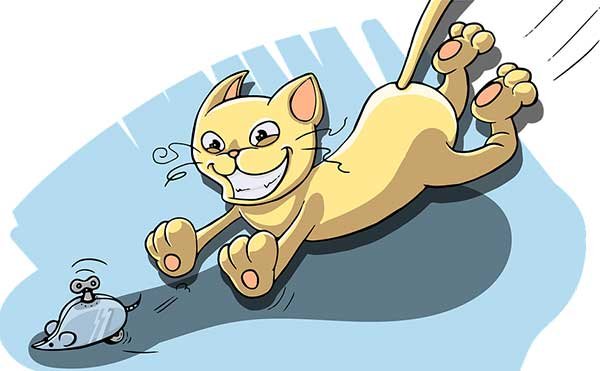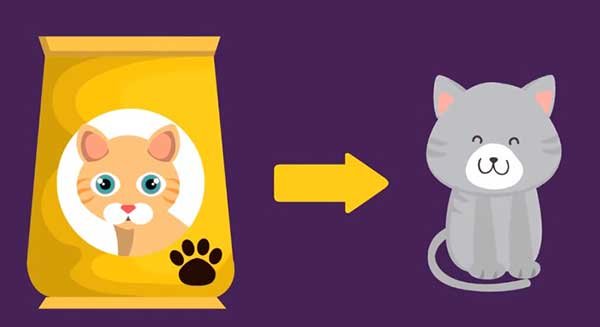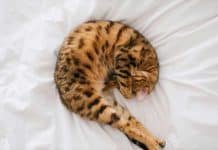In this article, we are going to talk about cat obesity and what you can do to help your cat lose weight if you do have an overweight cat.
So if you didn’t think that cat obesity was a problem, there actually exists an Association for Pet Obesity Prevention. And in their clinical survey (2018) they found that 60% of cats and 56% of dogs in the United States were classified as clinically obese according to their veterinary healthcare professional.
Risks of Cat Obesity
So, what are the risks of your cat being overweight or obese? The risks include: diabetes, kidney issues, heart disease, osteoarthritis, chronic inflammation, high blood pressure, cancers and the inability for mobility so the inability to clean themselves properly and that can result in infections and inflammation. Ultimately, a huge risk in being obese is having a shorter life span.
The good news is that cat obesity is relatively easy to prevent and also to treat. Just by switching your cat to a raw food diet in most cases it causes weight loss if your cat needed to lose weight.
So, it’s pretty simple to help your cat lose weight and stay as happy and healthy as they can be.
Cat Obesity: Simple ways to help your cat lose weight
With the right approach, you can help your cat lose weight and ensure she is around for years to come.
1- Stop free feeding

So, the number one tip is to stop free-feeding and ideally start feeding your cat a raw food diet.
When your cat was eating, assumingly free fed dry food diet, it was likely overeating as it is. Because it was an improper diet with improper nutrients. So your cat kept trying to eat and fulfilled its hunger which could never truly be satisfied because the nutrients weren’t there.
A cat’s natural instinct is not to graze, like cows or goats. Cats are true carnivores, in the sense that they’re meant to hunt and then feast and then fast.
Having regular mealtimes with a raw food diet not only encourages weight loss, if your cat needs it, but it so honors that inherent instinct that your cat has when it comes to eating.
2- Play with your cat

Make sure that you’re getting playtime with your cat. By playing with your cat for just 10 or 15 minutes twice a day, you’re helping him/her get out that aggression and that hunt and capture type playing mentality.
Not only does it help with their physical fitness but also their cognitive and mental health as well.
3- Cut back on the snacks

The third tip on weight loss for your cat is to cut back on the snacks or cut them out completely. Trace and snacks can really add up and they are basically extra calories and consumption that you’re overweight cat especially does not need.
Accurately measuring food is super important if you’re trying to help your cat lose weight.
4- Adjust your cat’s diet

Typically if you go to the vet and they put your cat on a commercial weight-reduction diet it involves, for the most part, some kind of dry kibble food and it involves portion size but this food is high fiber low fat.
Needless to say, if you have been doing your research on the benefits of raw food for your cat or you already feed your cat this way, you already know that dry kibble is not the ideal option when it comes to the health of your cat.
The good news is there’s a way to tweak the raw food diet into a weight-reduction diet itself. In order to keep the same volume of the food what you want to do is just make up for the weight in the skins with more muscle meat.
This way your cat will still be eating the same amount of food but it will have less calories because you’re using less fat.
Cat Obesity: How fast should your cat lose weight?
Now, all that being said it’s really important to consider that you don’t want your cat to lose too much weight too quickly.
Any veterinarian will tell you, in any reputable website about cat health or veterinary care, that depending on how overweight your cat is, you want to aim for no more than a half to 2% of its total body weight in weight loss per week.
For example, if your cat is 20 pounds and obese and has to lose weight, 1% of his/her body weight would be 0.2 pounds per week. Let’s say a healthy weight for cat is 15 pounds so that’s a 5-pound total weight loss. That would take roughly 25 weeks or around six months if your cat was to lose 1% per week.
The reason why you don’t want your cat to lose more than 2% of his/her body weight per week, it’s because that is a pretty rapid pace as is a fat breakdown in the body or fat loss. And cats are highly prone to fatty liver disease which is the accumulation of fat tissue in the liver.






